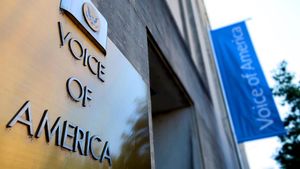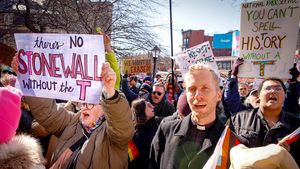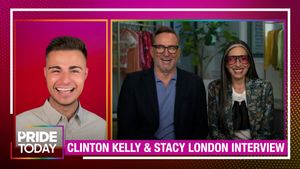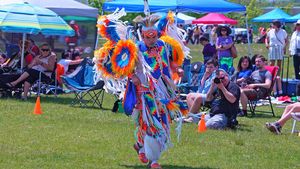"My entree into politics was really though my own personal story." This is how a lot of politicians would introduce themselves to you, and it's how Corey Johnson introduces himself to me. But personal stories like his are rare among politicians.
First of all, Johnson is young, having just turned 36, but he has been publicly active in LGBT activism for fully half his life. In 2000, he was a high school senior in Massachusetts and captain of his football team when he came out. Johnson was profiled in The New York Times. He was interviewed on 20/20. And the month he got his high school diploma, he gave a speech at the Millennium March for Equality in Washington, D.C.
That something as commonplace as one teenager's coming out became a national news story is a quaint reminder of how far we've come, but his early exposure to the high echelon of national LGBT activism encouraged Johnson to pursue a career in politics. Within the next year, he had dropped out of George Washington University and relocated to New York City.
Johnson spent the bulk of his twenties working with LGBT organizations - he was a program director with GLAAD - and cutting his teeth in the weeds of local politics, primarily as a volunteer Community Board member. At 28, he was elected Chair of his board and began to set his sights on his district's City Council seat, then occupied by Christine Quinn. When he ran, he was public about his HIV status, and his election made him the only HIV-positive elected official in the state of New York.
 Photo by Emil Cohen
Photo by Emil Cohen
Johnson campaigned throughout 2013, the year Edie Windsor's case made it to the Supreme Court. "I was so scared that, after we won the Windsor decision, people would pack up and say, 'It's over. We did it. We can go pack up and live behind our white picket fences...' I think what we've seen, with these draconian and hateful policies out of Washington, and the thousands of anti-LGBT policies that we're seeing all across the country state legislatures, is that municipalities need to lead the way."
Johnson represents large swaths of Manhattan's LGBT community; his district encompasses Chelsea, the West Village, and Hell's Kitchen. From his seat on City Council, Johnson has sponsored targeted LGBT legislation. Some such bills were considered among the most progressive LGBT initiatives in the country at the time, including two that made it easier for trans New Yorkers to correct the legal sex designations on their birth certificates. Johnson is also an outspoken advocate for New York's homeless LGBT youth. On May 30th, Johnson and NYC First Lady Chirlane McCray announced a $9.5 million initiative to assist at-risk LGBT youth. Also this year, under his leadership, the City Council unanimously approved three new measures affecting homeless youth in NYC, expanding the age eligibility for housing in the city's youth shelters, which have disproportionately assisted the LGBT community.
As a leader in the nation's largest city, Johnson feels a responsibility to enact LGBT policy that will set an example for municipalities nationwide. "In this dark, Orwellian moment in this country, New York needs to be bold and enact innovative policies. One thing we see across the country, especially since the 2016 election, is violence against LGBT people, disproportionately trans people and trans women of color. There's a lot of work still to be done. I want New York to be on the frontlines, pushing the envelope in making sure LGBT people can be full and equal citizens. Hate crimes have gone up nationally and in New York City, and if you can't be LGBT and feel safe in New York City, where can you feel safe?"
For Johnson, this attitude also applies to HIV/AIDS policy, which is why he's been active in helping the city's LGBT community gain access to PrEP. He would like to see the city's efforts replicated elsewhere. "We spent tens of millions of dollars providing free access to PEP and PrEP. Even if your insurance doesn't cover it, or if you're uninsured, you're going to have access, especially in low income communities of color where we have seen the highest rates of transmission among men who have sex with men." The effort seems to be making a difference. New York last year had its lowest rate of HIV transmissions since the beginning of the epidemic.
Access to PEP and PrEP are not the only factors in the city's multi-prong approach to lower the rate of new seroconversions, which is why Johnson remains committed to combating homelessness among LGBT youth. "The mantra we use in New York is that housing equals health care. Until you can get a roof over someone's head, you can't expect them to be able to become undetectable and get to doctor's appointments and take care of themselves, so building affordable housing and expanding benefits for people with HIV and AIDS is a key part of ending the epidemic and the scourge of HIV and AIDS."
This work could not be more personal for Speaker Johnson. "I seroconverted in 2004 when I was 22 years old. I lost my job and my health insurance less than two weeks after that happened. I lived with a lot of shame and anger at myself, and remorse for testing HIV-positive." However, nine years later, he was surprised when going public about his status did not even remotely affect his city council candidacy. "The real amazing thing about that is that in a hotly contested primary not one person asked me about it. People were worried about schools... No one ever brings it up. I'm the one who brings it up!"
Johnson is mum on state politics and the current Governor's race, but he concedes that many of his constituents have strong opinions: "It's gonna be a wild summer in the State of New York." He's marginally more open about his personal life, if only because he claims there's not much to speak of. "I don't date! I wish! I haven't been on a date in almost two years. I can't be on hook-up apps. I'm sober almost nine years, so I'm not someone who goes out to bars and clubs. It's harder for me to live the same life as another 36-year-old gay man. I'm exhausted, overwhelmed, and stressed... but it's worth the sacrifice."


































 Photo by Emil Cohen
Photo by Emil Cohen










































